Report on PESTEL Analysis of Unilever in Global Business Environment
VerifiedAdded on 2022/12/28
|5
|735
|90
Report
AI Summary
This report presents a PESTEL analysis of Unilever, a UK-based consumer goods company. It examines the political, economic, social, technological, environmental, and legal factors influencing Unilever's operations and performance in the global business environment. The analysis considers political factors like government regulations and trade norms, economic factors such as wages and economic stability, social factors including consumer health consciousness, technological advancements, environmental programs and sustainability initiatives, and legal aspects like consumer rights and environmental regulations. The report concludes that by carefully analyzing its external environment, Unilever can identify opportunities and threats to enhance its competitiveness and sustainability in the FMCG sector.
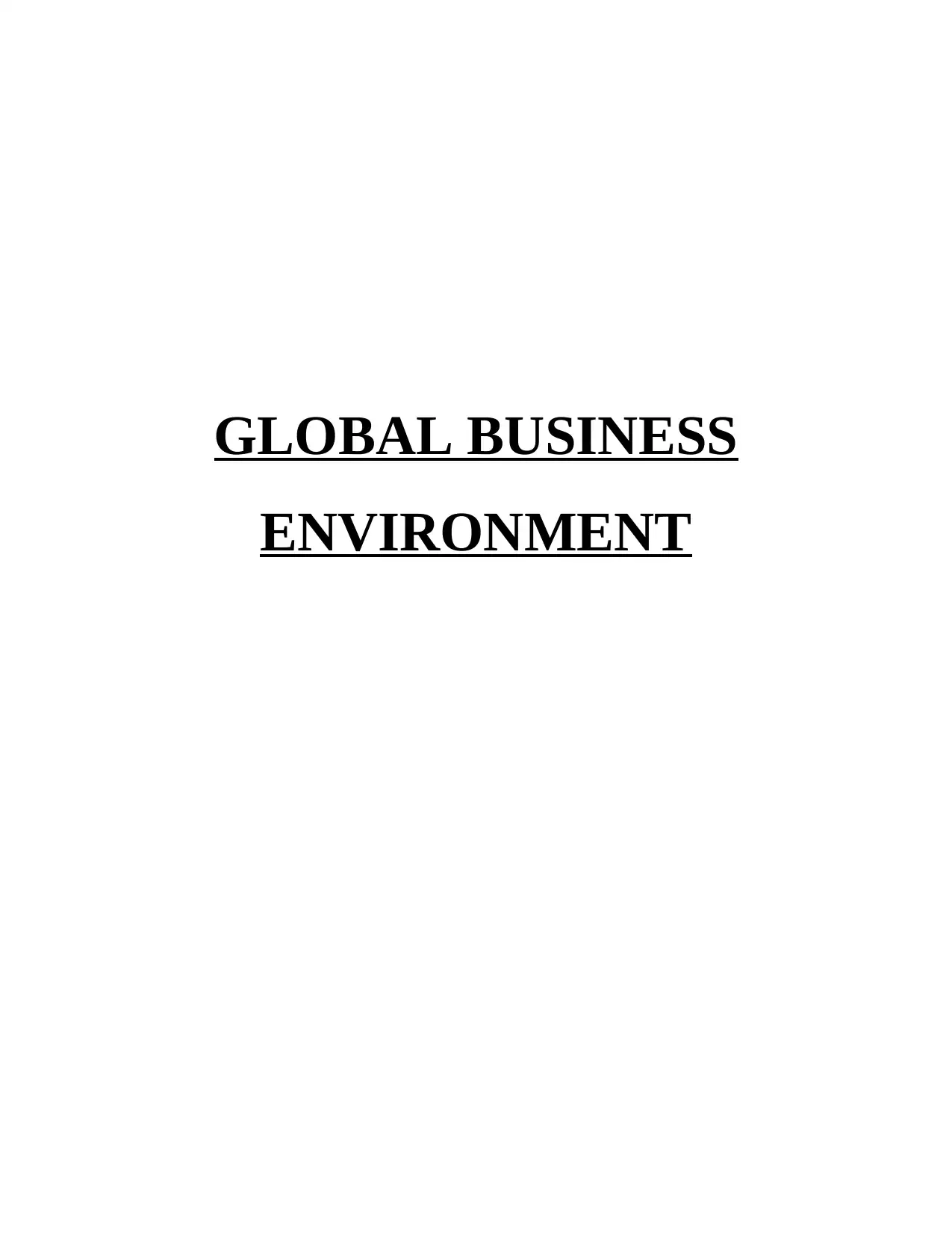
GLOBAL BUSINESS
ENVIRONMENT
ENVIRONMENT
Paraphrase This Document
Need a fresh take? Get an instant paraphrase of this document with our AI Paraphraser
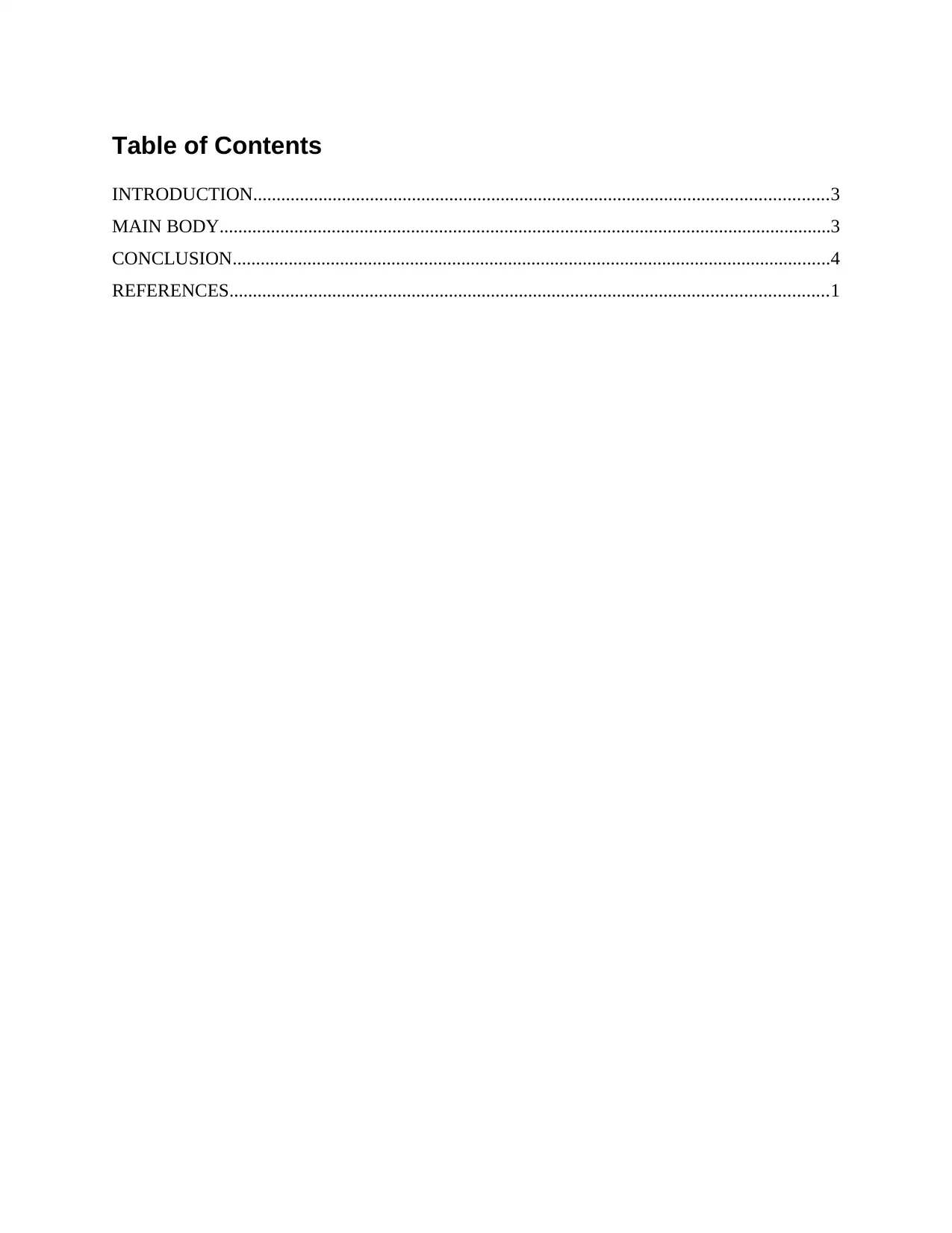
Table of Contents
INTRODUCTION...........................................................................................................................3
MAIN BODY...................................................................................................................................3
CONCLUSION................................................................................................................................4
REFERENCES................................................................................................................................1
INTRODUCTION...........................................................................................................................3
MAIN BODY...................................................................................................................................3
CONCLUSION................................................................................................................................4
REFERENCES................................................................................................................................1
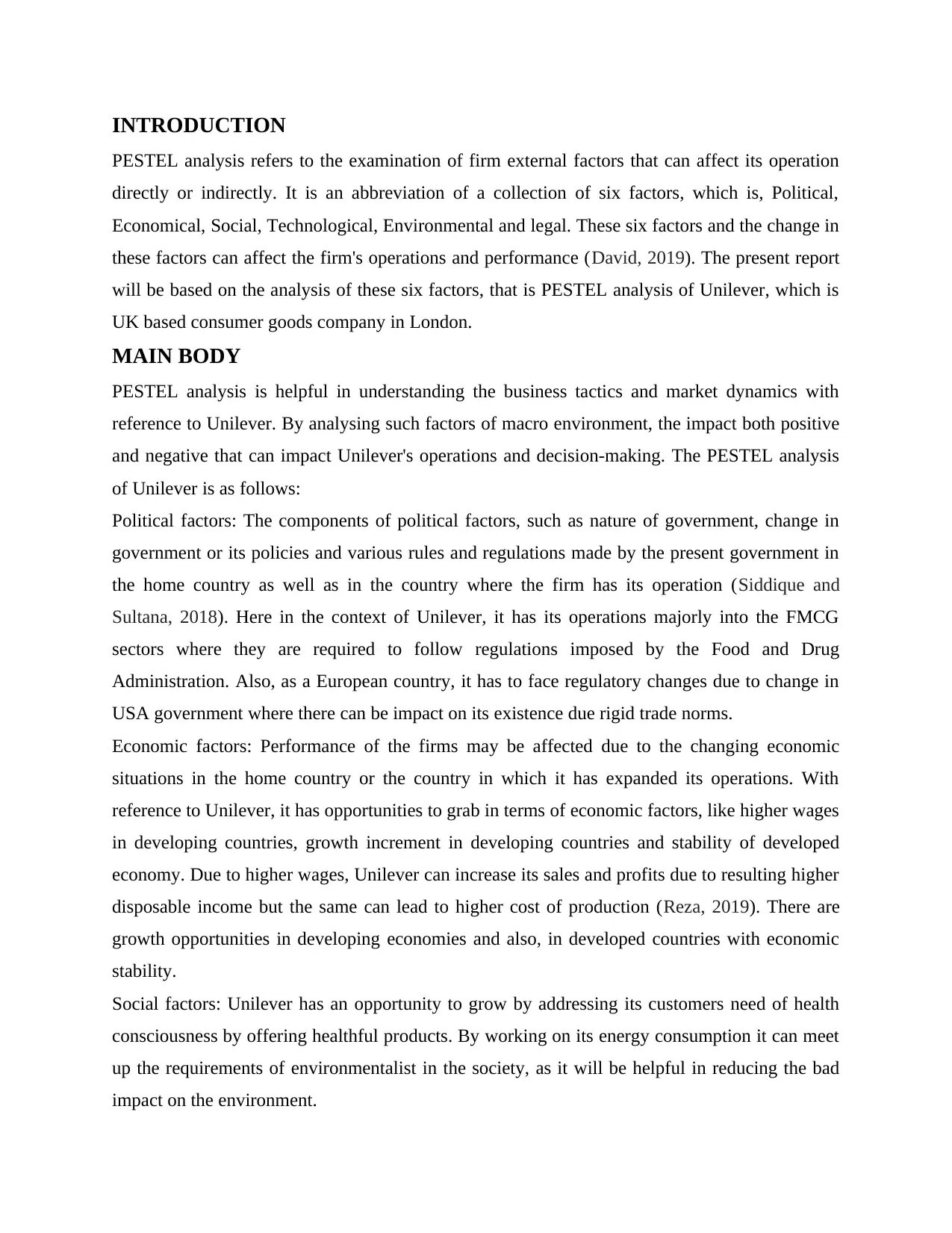
INTRODUCTION
PESTEL analysis refers to the examination of firm external factors that can affect its operation
directly or indirectly. It is an abbreviation of a collection of six factors, which is, Political,
Economical, Social, Technological, Environmental and legal. These six factors and the change in
these factors can affect the firm's operations and performance (David, 2019). The present report
will be based on the analysis of these six factors, that is PESTEL analysis of Unilever, which is
UK based consumer goods company in London.
MAIN BODY
PESTEL analysis is helpful in understanding the business tactics and market dynamics with
reference to Unilever. By analysing such factors of macro environment, the impact both positive
and negative that can impact Unilever's operations and decision-making. The PESTEL analysis
of Unilever is as follows:
Political factors: The components of political factors, such as nature of government, change in
government or its policies and various rules and regulations made by the present government in
the home country as well as in the country where the firm has its operation (Siddique and
Sultana, 2018). Here in the context of Unilever, it has its operations majorly into the FMCG
sectors where they are required to follow regulations imposed by the Food and Drug
Administration. Also, as a European country, it has to face regulatory changes due to change in
USA government where there can be impact on its existence due rigid trade norms.
Economic factors: Performance of the firms may be affected due to the changing economic
situations in the home country or the country in which it has expanded its operations. With
reference to Unilever, it has opportunities to grab in terms of economic factors, like higher wages
in developing countries, growth increment in developing countries and stability of developed
economy. Due to higher wages, Unilever can increase its sales and profits due to resulting higher
disposable income but the same can lead to higher cost of production (Reza, 2019). There are
growth opportunities in developing economies and also, in developed countries with economic
stability.
Social factors: Unilever has an opportunity to grow by addressing its customers need of health
consciousness by offering healthful products. By working on its energy consumption it can meet
up the requirements of environmentalist in the society, as it will be helpful in reducing the bad
impact on the environment.
PESTEL analysis refers to the examination of firm external factors that can affect its operation
directly or indirectly. It is an abbreviation of a collection of six factors, which is, Political,
Economical, Social, Technological, Environmental and legal. These six factors and the change in
these factors can affect the firm's operations and performance (David, 2019). The present report
will be based on the analysis of these six factors, that is PESTEL analysis of Unilever, which is
UK based consumer goods company in London.
MAIN BODY
PESTEL analysis is helpful in understanding the business tactics and market dynamics with
reference to Unilever. By analysing such factors of macro environment, the impact both positive
and negative that can impact Unilever's operations and decision-making. The PESTEL analysis
of Unilever is as follows:
Political factors: The components of political factors, such as nature of government, change in
government or its policies and various rules and regulations made by the present government in
the home country as well as in the country where the firm has its operation (Siddique and
Sultana, 2018). Here in the context of Unilever, it has its operations majorly into the FMCG
sectors where they are required to follow regulations imposed by the Food and Drug
Administration. Also, as a European country, it has to face regulatory changes due to change in
USA government where there can be impact on its existence due rigid trade norms.
Economic factors: Performance of the firms may be affected due to the changing economic
situations in the home country or the country in which it has expanded its operations. With
reference to Unilever, it has opportunities to grab in terms of economic factors, like higher wages
in developing countries, growth increment in developing countries and stability of developed
economy. Due to higher wages, Unilever can increase its sales and profits due to resulting higher
disposable income but the same can lead to higher cost of production (Reza, 2019). There are
growth opportunities in developing economies and also, in developed countries with economic
stability.
Social factors: Unilever has an opportunity to grow by addressing its customers need of health
consciousness by offering healthful products. By working on its energy consumption it can meet
up the requirements of environmentalist in the society, as it will be helpful in reducing the bad
impact on the environment.
⊘ This is a preview!⊘
Do you want full access?
Subscribe today to unlock all pages.

Trusted by 1+ million students worldwide
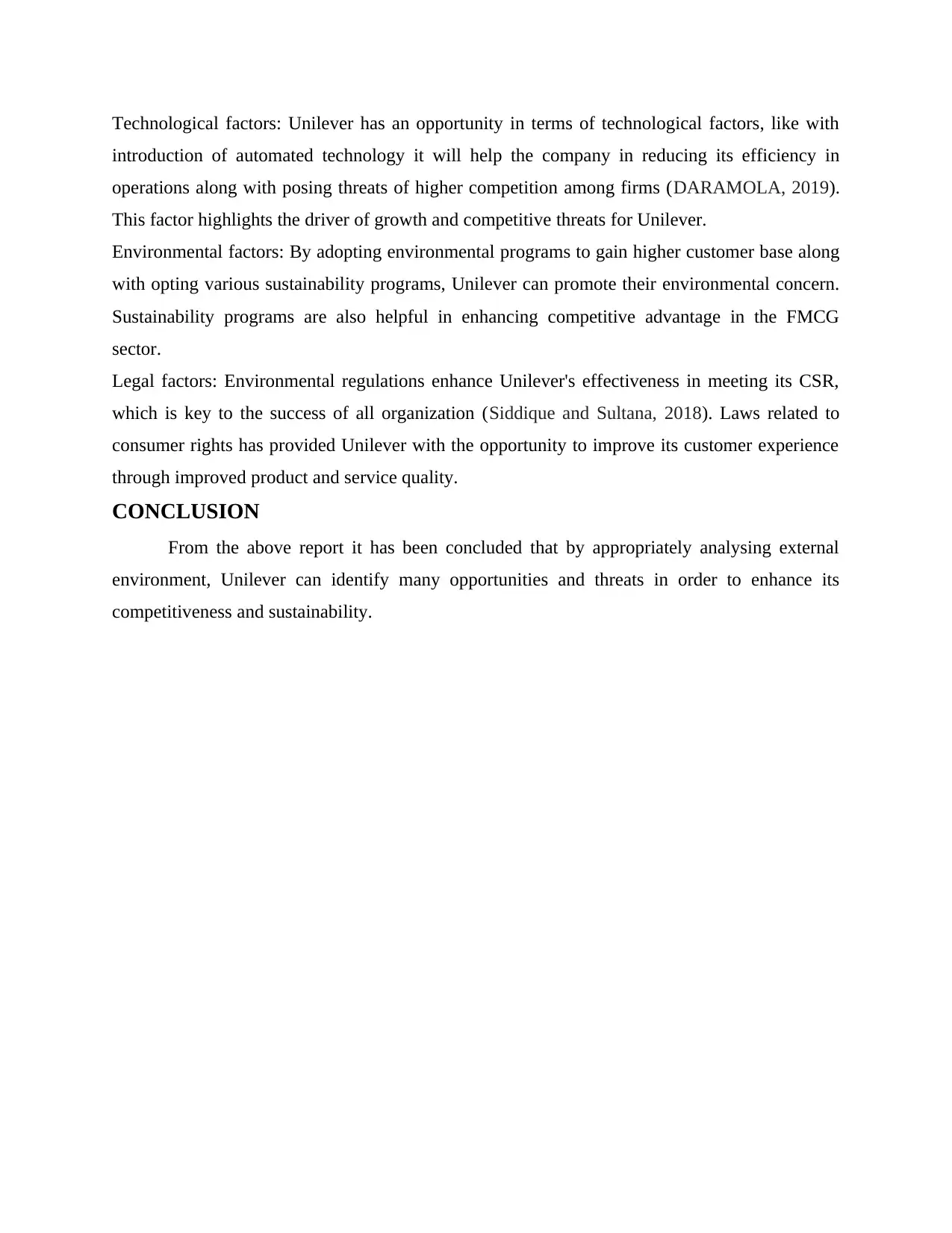
Technological factors: Unilever has an opportunity in terms of technological factors, like with
introduction of automated technology it will help the company in reducing its efficiency in
operations along with posing threats of higher competition among firms (DARAMOLA, 2019).
This factor highlights the driver of growth and competitive threats for Unilever.
Environmental factors: By adopting environmental programs to gain higher customer base along
with opting various sustainability programs, Unilever can promote their environmental concern.
Sustainability programs are also helpful in enhancing competitive advantage in the FMCG
sector.
Legal factors: Environmental regulations enhance Unilever's effectiveness in meeting its CSR,
which is key to the success of all organization (Siddique and Sultana, 2018). Laws related to
consumer rights has provided Unilever with the opportunity to improve its customer experience
through improved product and service quality.
CONCLUSION
From the above report it has been concluded that by appropriately analysing external
environment, Unilever can identify many opportunities and threats in order to enhance its
competitiveness and sustainability.
introduction of automated technology it will help the company in reducing its efficiency in
operations along with posing threats of higher competition among firms (DARAMOLA, 2019).
This factor highlights the driver of growth and competitive threats for Unilever.
Environmental factors: By adopting environmental programs to gain higher customer base along
with opting various sustainability programs, Unilever can promote their environmental concern.
Sustainability programs are also helpful in enhancing competitive advantage in the FMCG
sector.
Legal factors: Environmental regulations enhance Unilever's effectiveness in meeting its CSR,
which is key to the success of all organization (Siddique and Sultana, 2018). Laws related to
consumer rights has provided Unilever with the opportunity to improve its customer experience
through improved product and service quality.
CONCLUSION
From the above report it has been concluded that by appropriately analysing external
environment, Unilever can identify many opportunities and threats in order to enhance its
competitiveness and sustainability.
Paraphrase This Document
Need a fresh take? Get an instant paraphrase of this document with our AI Paraphraser
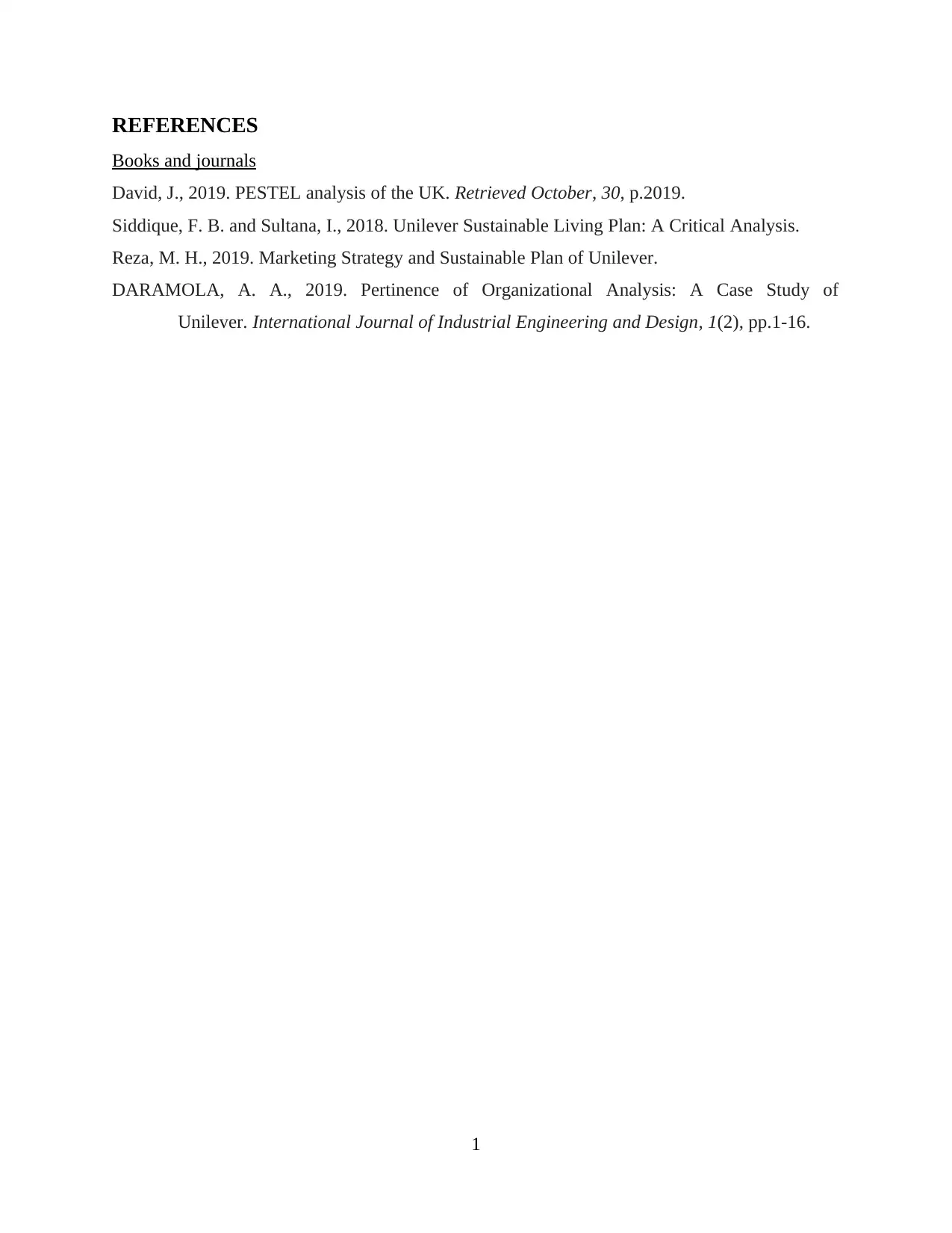
REFERENCES
Books and journals
David, J., 2019. PESTEL analysis of the UK. Retrieved October, 30, p.2019.
Siddique, F. B. and Sultana, I., 2018. Unilever Sustainable Living Plan: A Critical Analysis.
Reza, M. H., 2019. Marketing Strategy and Sustainable Plan of Unilever.
DARAMOLA, A. A., 2019. Pertinence of Organizational Analysis: A Case Study of
Unilever. International Journal of Industrial Engineering and Design, 1(2), pp.1-16.
1
Books and journals
David, J., 2019. PESTEL analysis of the UK. Retrieved October, 30, p.2019.
Siddique, F. B. and Sultana, I., 2018. Unilever Sustainable Living Plan: A Critical Analysis.
Reza, M. H., 2019. Marketing Strategy and Sustainable Plan of Unilever.
DARAMOLA, A. A., 2019. Pertinence of Organizational Analysis: A Case Study of
Unilever. International Journal of Industrial Engineering and Design, 1(2), pp.1-16.
1
1 out of 5
Related Documents
Your All-in-One AI-Powered Toolkit for Academic Success.
+13062052269
info@desklib.com
Available 24*7 on WhatsApp / Email
![[object Object]](/_next/static/media/star-bottom.7253800d.svg)
Unlock your academic potential
Copyright © 2020–2025 A2Z Services. All Rights Reserved. Developed and managed by ZUCOL.





